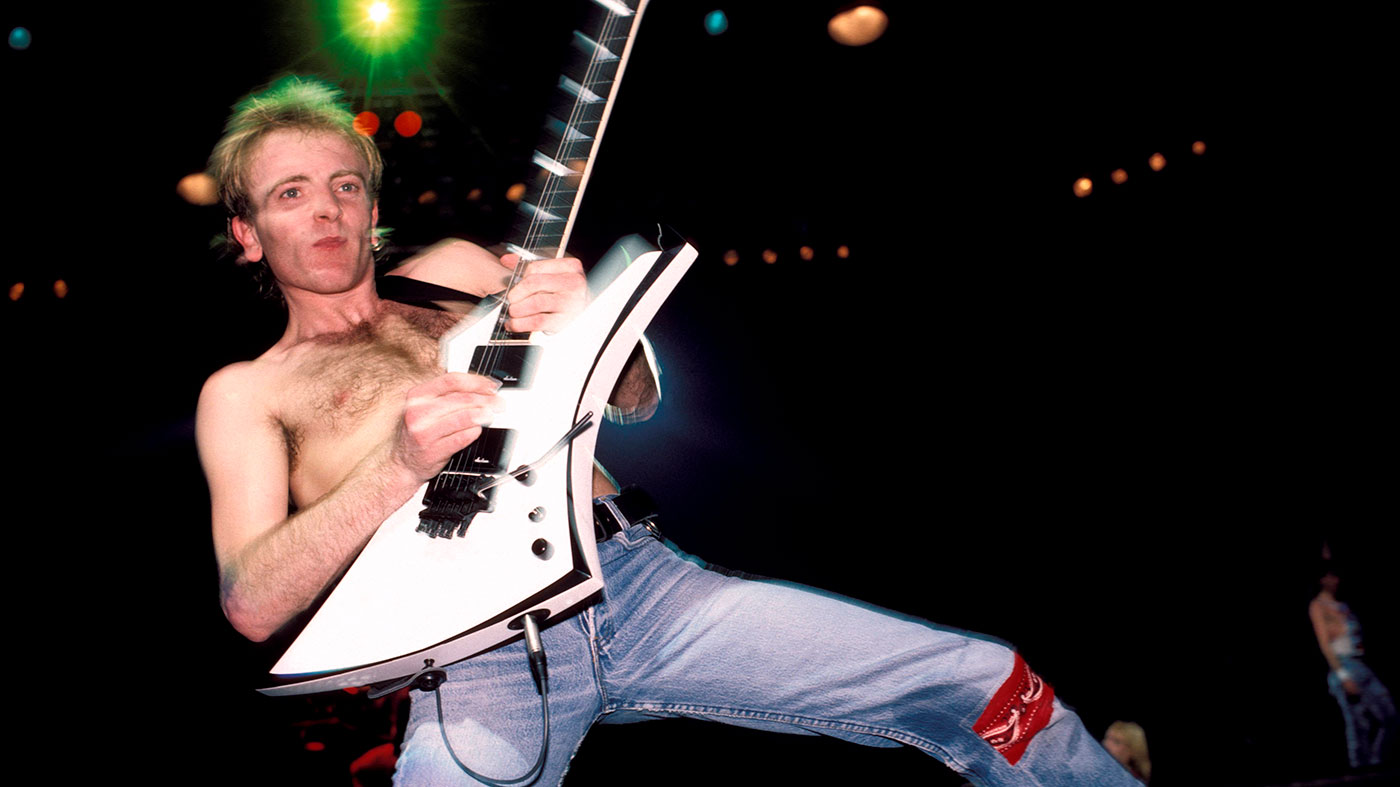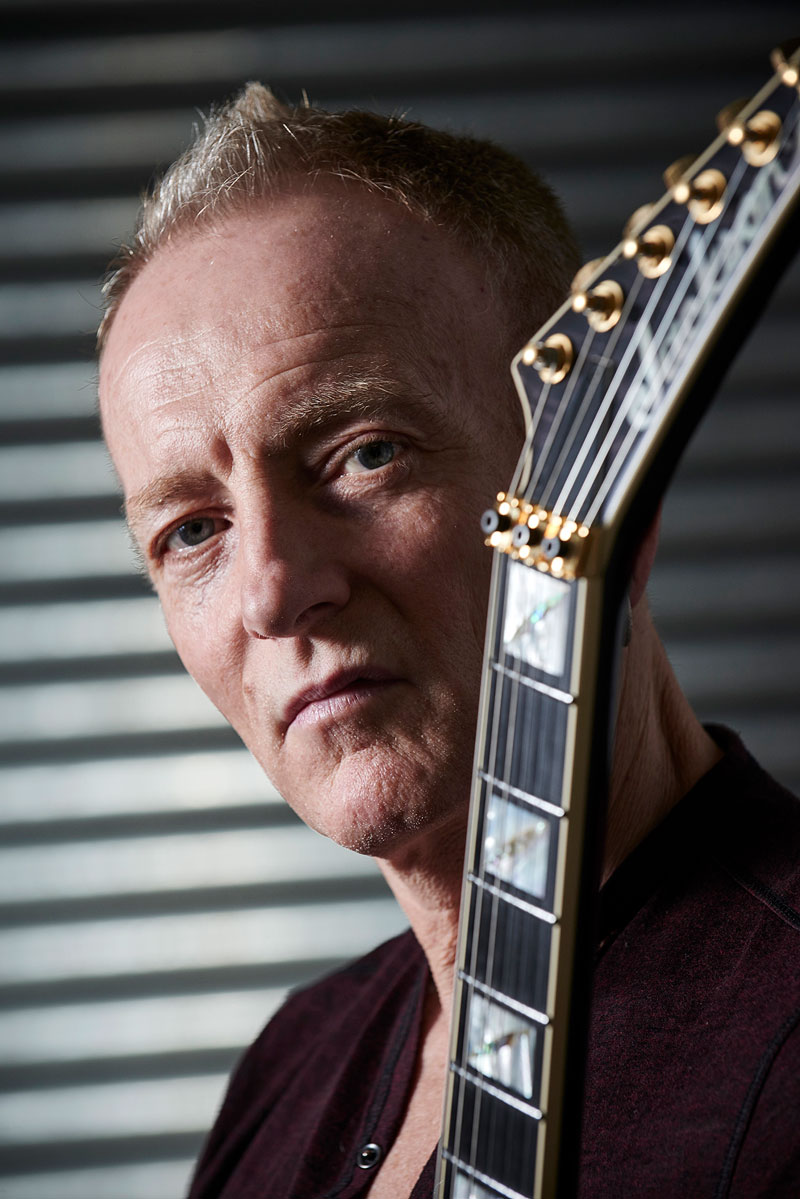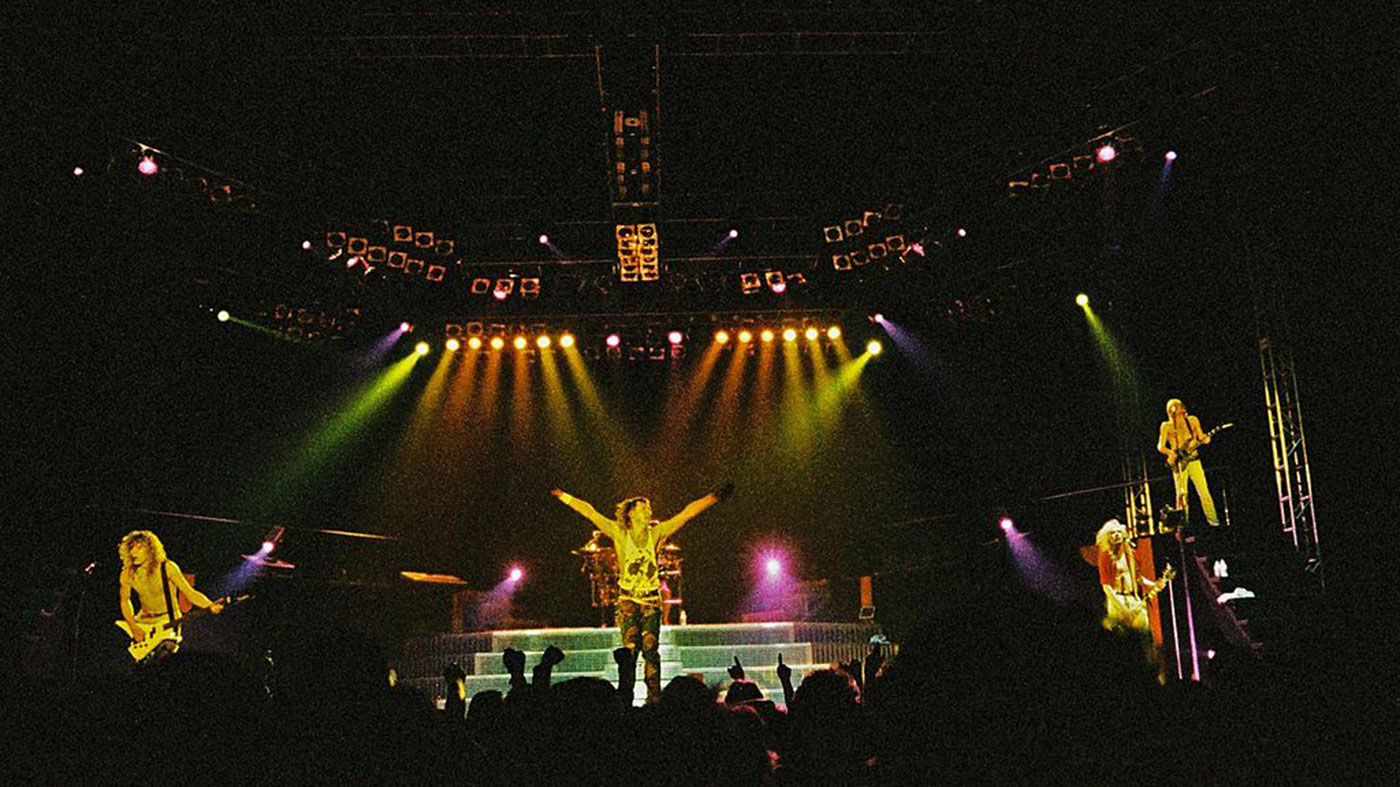Def Leppard's Phil Collen: “We worked. We went somewhere. I came out of Hysteria a better player”
30 years on, the guitarist revisits a classic album

Before it stormed to 25 million sales, 1987's Hysteria cost Def Leppard three years, $5 million and a drummer's arm. Guitarist Phil Collen remembers the mayhem, tragedy and skyscraping ambition of one of the era's classic albums.
IIt was August 1987, and Def Leppard’s newly released fourth album, Hysteria, had all the makings of a cautionary tale. Over three agonising years, the Sheffield rockers had clawed forwards through a hail of bombshells, ranging from fired producers to a horrific car crash that cost drummer Rick Allen his left arm. “You really did start to think,” frontman Joe Elliott muttered in one interview, “that we were cursed.”
I think it’s the best thing we ever did. It was our commercial and creative zenith
Now, with the final studio tab nudging $5 million, the band toured Hysteria across the States to discover if the fans who’d bought 1983’s Pyromania had deserted them.
“You’re out there touring, you’re in debt, no-one’s showing up,” reflects Leppard guitarist Phil Collen. “I remember, when we’d just released Hysteria, we played the Tacoma Dome, Washington, and got 11,000 people in. Which is great. But it holds 30,000. We played in Kentucky, where it held 23,000 and we had 3,000 in. And it was like, ‘This is depressing. We’ve got this great album. Where’s everyone gone?’”
But then something happened (and it wouldn’t be the first time an 80s rock band was saved by strippers). Recorded as an afterthought and belatedly released as Hysteria’s fourth single, Pour Some Sugar On Me was adopted as a pole-dancing anthem. It then spread to MTV, before hitting No 2 on the Billboard chart and kickstarting the album’s march towards 25 million sales.
The numbers are huge, agrees Collen, but what resonates today is Hysteria’s musical ambition, from the forest of multi-tracked guitars to the masterclass of song construction. “Looking back,” he says, “we almost created a new genre of music.”
Thirty years down the line, how do you feel about Hysteria?
Want all the hottest music and gear news, reviews, deals, features and more, direct to your inbox? Sign up here.

Def Leppard's Phil Collen: the 11 records that changed my life
“I think it’s the best thing we ever did. It was our commercial and creative zenith. Most of the credit goes to Mutt Lange [producer], because he really pushed us to do something different. The first thing he said was, ‘We can’t make ‘Pyromania 2’, because every other rock band in the world is doing that. We’ve got to dig a bit deeper, and it’s gonna be a lot of hard work.’
“Jimi Hendrix probably could have done it in his sleep. But us mere mortals have to work hard at it. But it paid off. Because here we are, 30 years later, still talking about it.”
They say great music comes from great suffering. Would you say that was a fair description of Hysteria?
“Obviously Rick went through the wringer: it was awful for him. Then Steve Clark [guitarist] suffered later. Yeah, it was hard work at times, and there was some shitty things going off. But I was so inspired by Mutt. It was a learning curve working with him. People say, ‘Oh, he’s a taskmaster’, but he’s not. It was all about discovery.
“The thing is, a lot of guitar players, they all read from the same book, play from the same licks. With that album, we worked. We went somewhere. Mutt taught us how to sing, how to play guitar better. I came out of Hysteria a better player, without a doubt.”
What was different about the approach you all took on Hysteria?
“The melody was king. And you can totally fuck that up. So the guitars were there to enhance it. Y’know, Hysteria does sound like an 80s album, but it was trying to. It was trying to cross over, and hard rock bands didn’t really do that.
“There was a big difference between, say, Priest, Maiden and us. We were more in the area of The Police and Billy Idol and even ZZ Top, who were a blues band, but they’d done this electronic album, Eliminator [1983], and had their biggest hit. It wasn’t about trying to be a big, macho rock band. It was about trying to create great music.”

Six-string sensei
How about your philosophy on guitar?
A lot of bands will have two guitar players don’t really utilise that... Gods Of War had five different sections and hit every note on the fretboard
“The ego thing gets in the way with guitar playing. So if you can get that out of the way, you’re on the path to making great music. A lot of bands will have two guitar players but they don’t really utilise that. They just play exactly the same. It’s uncreative and uninspired.
“Me and Steve Clark did the opposite. We were trying to develop this harmony chord thing. We’d be muting the strings and we’d have a counter-rhythm and counter-melody going off. Lots of different things. Gods Of War had five different sections and hit every note on the fretboard. On the song Hysteria, there’s probably eight guitar parts going off at the same time on the chorus. Maybe even more. Not to be gratuitous, but to add something to it.”
People always cast you as the ice-cold virtuoso and Steve as the sloppy genius. Do you agree?
“Not even slightly. I’m about the sloppiest player you could possibly imagine, especially when I’m playing acoustic. I struggled. Mutt made me a way better rhythm player, because I was racing and dragging, not on the snare. This was both of us, me and Steve. Mutt changed that. But yeah, Steve had more swagger than anyone I’d ever seen. His whole thing was that he wasn’t a standard player. He’d come up with ideas that other guys wouldn’t do. Like the solo in the title track.
“We actually both played that together live, at the same time, plugged into a Rockman each. But he came up with the whole melody and it almost reminded you of a Japanese garden. It had these weird note choices, really beautiful. The middle section of Pour Some Sugar On Me, Mutt said, ‘Do you remember that thing Steve was playing in the studio a year ago?’ We just pulled it up on one of the demos and played it into the song.”
Were you two still causing mayhem?
“By Hysteria, it had kind of mellowed out. At the end of the Pyromania tour, we started writing the Hysteria songs in Dublin, and one of the classic moments was that me and Steve borrowed Joe Elliott’s car, went out, got so shit-faced drunk… y’know, I bought a Rolex, he bought a car, we had our ears pierced. And we were driving around - which is so uncool - got back, and later on, Joe was like, ‘Fuck, you left my car parked sideways, left the radio on and everything!’ I had no idea. And my ear hurt because I had this new earring. And I thought, ‘Shit, I’ve got to stop drinking.’ So that started me stopping. Shit, it made such a difference. The playing got better. Everything got better when I stopped drinking.”
Riffs for days
There are some great riffs on Hysteria…
“Yeah. I came up with that Animal riff, and I did this palm muting thing on the bridge section that I’d got from Ain’t Talkin’ ’Bout Love by Van Halen [sings riff ] and changed to a groove and a counter-melody. And it just worked a treat. I like Rocket. That was a bit quirky, it had this weird riff, and a drum pattern reminiscent of Burundi Black, this African tribal thing from the 70s.
Mutt actually came up with that Pour Some Sugar On Me riff. He’s a country fan, so he was playing it with his fingers
“Mutt actually came up with that Pour Some Sugar On Me riff. He’s a country fan, so he was playing it with his fingers. But y’know, my fingerstyle really sucks and I use a metal pick, so that was my interpretation. I still kept that great phrasing. But instead of being more staccato and doing a chicken-picking thing - which you would as a country player - it was more fluid and less staccato.”
Were those parts easy to pin down?
“The hardest thing was playing some of those guitar parts live while you’re doing a vocal. I really struggle with it, to this day. I remember, we’d never done Love Bites as a band. Y’know, it was strictly a studio song. But it went to No 1 in the Billboard charts while we were on tour in America, so it was like, ‘Shit, we’re gonna have to learn it.’
“We booked a rehearsal studio in Vancouver for two days, and we were frantically learning it, like, ‘What’s the most prominent guitar part and how can I play that and sing it?’ It was scary. Like, ‘This sounds terrible, we’re fucking it up.’ It’s funny, because now we kill it every night.”
What about the solos on Hysteria?
“Hysteria wasn’t too heavy from a solo point of view. I preferred the stuff on Pyromania like Stage Fright, Photograph, Foolin’, all that stuff. On Hysteria, the guitars had to enhance the songs, so the solos took a back seat. I liked Run Riot. That was cool. I wanted to do it again, because there were a couple of mistakes. But Mutt was going, ‘Leave it’, because it had the right vibe. I do like the solo in Animal. I still remember the room - I had a Rockman plugged into a Marshall 50-watt. It was just a guide, really, but it ended up going on the record.”
Hyst-gear-ria
How do you feel about your guitar tone on Hysteria?
“It wasn’t traditional. That’s what was great about it. This was the 80s, so drum sounds were changing, and you had the Fairlights and Synclaviers, all this stuff. Sonically, there was a different area we had to cover. The traditional guitar tone, with Marshalls and 4x12s mic’d up… it would have got lost. It would have just been this massive fuzz.
The traditional guitar tone, with Marshalls and 4x12s mic’d up… it would have got lost
“We ended up using the first version of the Rockman, mainly, and that was great ’cos you could actually hear everything. Everything had its space. You could get sounds that worked in the context of these huge bass and drums, and when you tracked them up, you could hear all the parts. We used the odd thing like a Randall through a Marshall cab, and, at the beginning of Animal, I remember standing on top of this Gallien-Krueger, cranked up, just to get the feedback.
“I never used any pedals on that record. But I remember, Brian May gave me a boost pedal he’d made himself and actually used on Killer Queen, which was totally cool. I used it on the rhythm part of Run Riot, and it really did alter the sound, made it more aggressive. It was great to get Brian on the album, one way or another.”
How about your Hysteria guitars?

“The main guitar was this 78 Japanese Strat called Felix that I got for my 21st birthday. It had a Kahler and a DiMarzio Super Distortion. All of Hysteria was pretty much done on that. Even Steve used it a lot, because the intonation was perfect, and Mutt was such a stickler for guitars being in tune. So many guitars, you can go up the neck and they’re wonky and the intonation is out. But this guitar was just bang-on.”
Would it have made a difference if you’d had your signature Jacksons?
If I’d had my PC1, oh God, yeah, it would have been amazing. Because they’re just the best recording guitars ever
“Yeah. I got my first Jackson - this crackle-finish Soloist with a Super Distortion - and that’s what I used on the intro of Pour Some Sugar On Me. But if I’d had my PC1, oh God, yeah, it would have been amazing. Because they’re just the best recording guitars ever.”
Famously, Mutt recorded your strings individually on the title track. Can you tell?
“Well, it was only on the ‘I gotta know tonight’ section. He wanted that part to have clarity. When you play it as a chord, there’s a slight arpeggio-ness to it. So we wanted to get rid of that. And we didn’t want it to sound like a keyboard.
“So you’d hit each note, track that up, double-track everything, so it would be six strings double-tracked. So it didn’t sound like it was plucked, it didn’t sound like it was arpeggiated and it didn’t sound like a keyboard. It’s a great song to talk about, because it had all the elements of the Hysteria recording process.”
Slow burn
How did you deal with the circus after Hysteria stormed the charts?
“Well, it didn’t happen initially. It tanked. We’d spent almost $5 million on Hysteria, and it came out and we hadn’t broken even - and it stopped selling. And it wasn’t until Pour Some Sugar On Me came out that it kinda kicked in. When we released Pyromania, and MTV was in its infancy, and Photograph was all over the place - that was Justin Bieber time. We would literally get mobbed.

Hysteria took a real long time to get going. So it was humbling. When it broke, it was actually more like, ‘Thank f*** for that.’
“Whereas Hysteria took a real long time to get going. So it was humbling. When Hysteria broke, it was actually more like, ‘Thank fuck for that.’ We were grateful. That we’d finally got there. It was a long, hard slog. But it’s always been like that for us, I have to say. It’s always been a struggle. It’s never been a breeze.”
Steve died from alcohol poisoning four years later. Do you think Hysteria’s success caused his problems or deepened them?
“I think that stuff would have happened anyway. Y’know, I was able to stop drinking and getting fucked-up - and Steve wasn’t. We actually sat down and talked about it. Because all of a sudden, we weren’t going out together every night. When I started blacking out and not remembering anything, for me, that was pretty dark, so I stopped drinking.
“We went to see Steve in hospital once and one of the doctors was talking about addiction and alcoholism and what it does to your body. Some people just can’t stop. And if they ever have a drink, they go straight back to where they were. And this doctor said that 70 per cent of people who get to that stage end up dying, either from crashing the car, falling down a ladder or whatever. Steve was in that category. So I think whatever happened, it would have happened at some point, the way he was going.”
Would you change anything about the Hysteria guitars if you could go back?
“No, I actually wouldn’t. They were perfect for that album. I mean, I’d like to hear them sound a bit more aggressive. The last five albums I’ve done with Guitar Rig 5 and it sounds more aggressive, like a real amp. I’d like to do that… but I actually don’t think the Hysteria album would benefit from it. I think it was perfect the way it was. It was a time and a place.”
Do you feel that Hysteria gets the respect it deserves as a classic guitar album?
“No, not really. Well, more so now. Especially when you have guitar geniuses like Joe Satriani, Paul Gilbert, Steve Vai and Brian May actually saying to you, ‘That is amazing guitar work.’ Y’know, Prince has mentioned it, Stevie Wonder has mentioned it. Alice Cooper actually said to me, ‘Whenever I go into the studio, I throw Hysteria on, just to hear how the room sounds.’
“That’s really cool and a wonderful honour. I trust their judgement. Because you just don’t know, as a guitar player. You just follow your gut. But Hysteria has had such a far-reaching influence. You knew that you’d done something right…”
Def Leppard’s Hysteria 30th Anniversary Edition is out now on Mercury.

